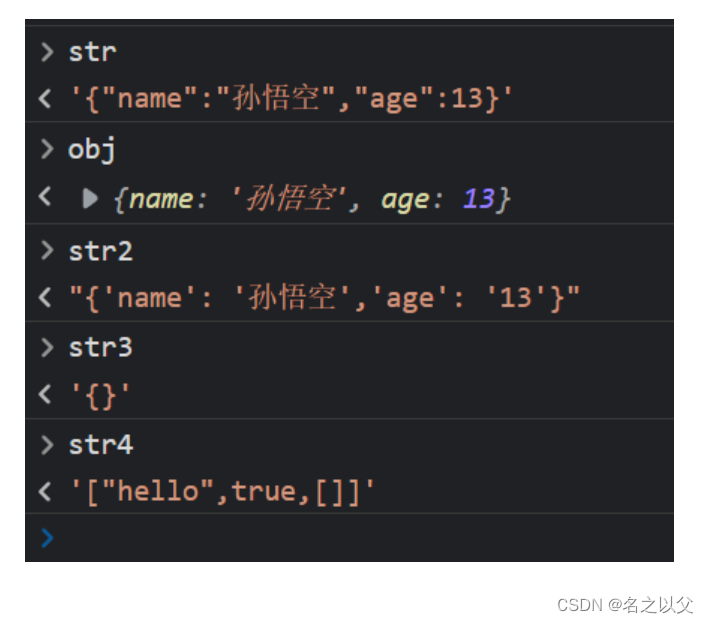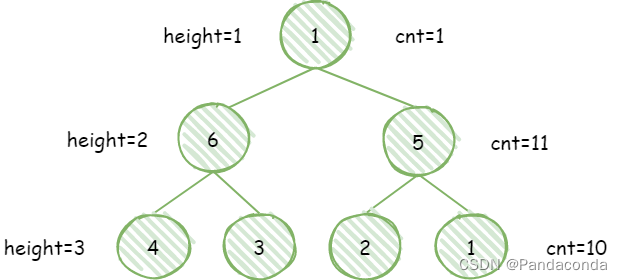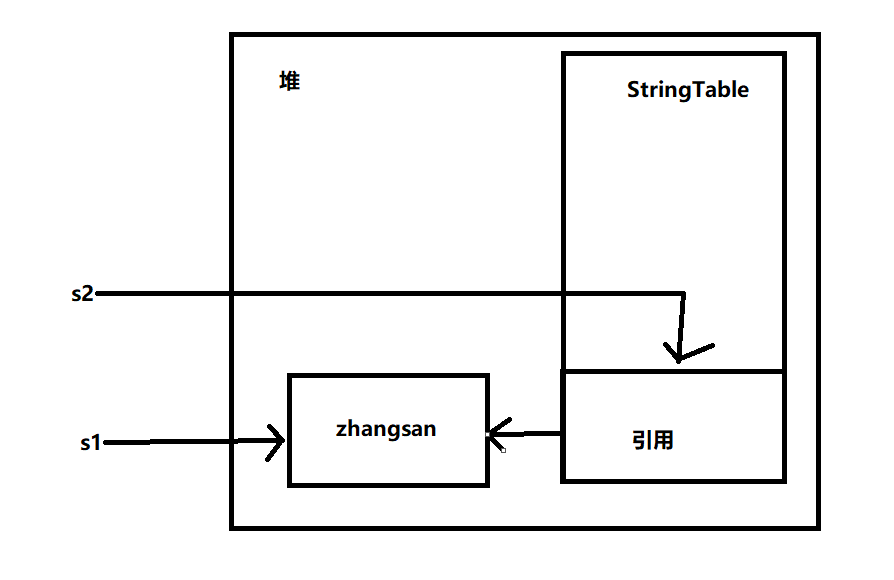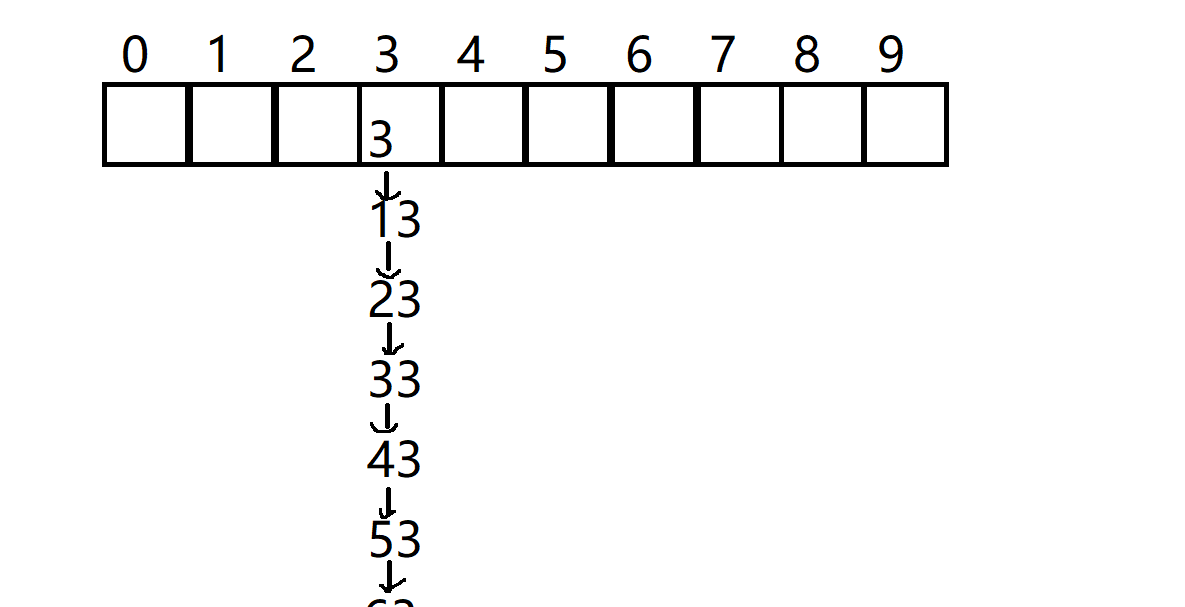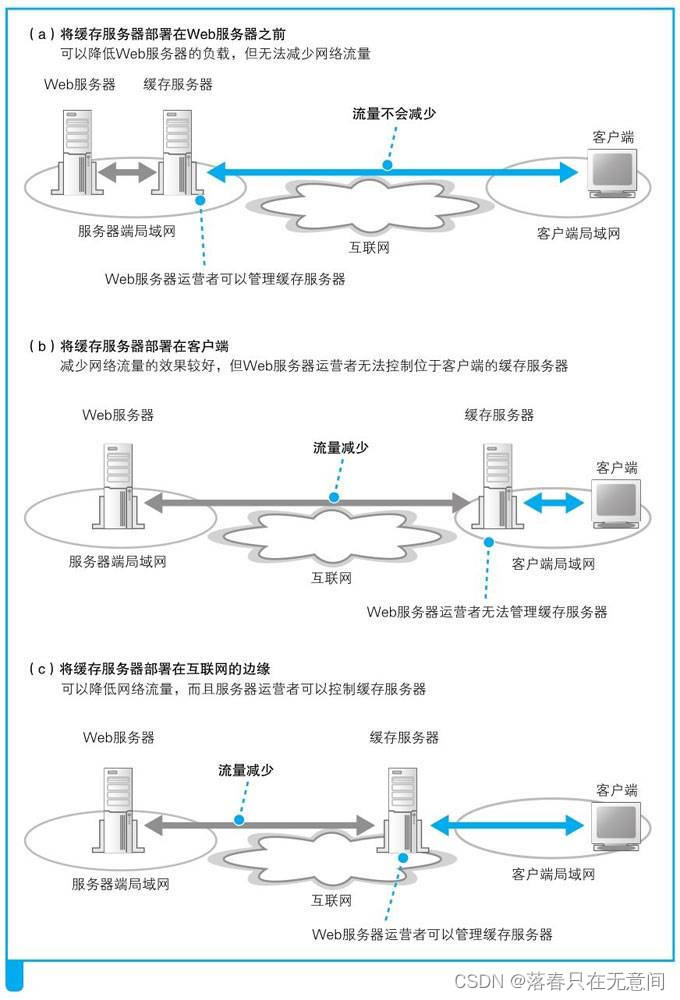客户端从服务端读取配置文件
客户端启动的时候会扫描到boostrap.yml中的信息,扫描到标签@ConditionalOnProperty会将NacosConfigBootstrapConfiguration 中的bean注入。其中NacosConfigProperties就是读取的boostrap.yml中spring.cloud.nacos.config下的配置项。NacosConfigBootstrapConfiguration创建除了NacosPropertySourceLocator对象并注入容器。
@Configuration(proxyBeanMethods = false)
@ConditionalOnProperty(name = "spring.cloud.nacos.config.enabled", matchIfMissing = true)
public class NacosConfigBootstrapConfiguration {
@Bean
@ConditionalOnMissingBean
//扫描bootstrap.yml中的spring.cloud.nacos.config下的配置项
public NacosConfigProperties nacosConfigProperties() {
return new NacosConfigProperties();
}
@Bean
@ConditionalOnMissingBean
//得到NacosConfigService
public NacosConfigManager nacosConfigManager(
NacosConfigProperties nacosConfigProperties) {
return new NacosConfigManager(nacosConfigProperties);
}
@Bean
//创建处NacosPropertySourceLocator
public NacosPropertySourceLocator nacosPropertySourceLocator(
NacosConfigManager nacosConfigManager) {
return new NacosPropertySourceLocator(nacosConfigManager);
}
/**
* Compatible with bootstrap way to start.
*/
@Bean
@ConditionalOnMissingBean(search = SearchStrategy.CURRENT)
@ConditionalOnNonDefaultBehavior
public ConfigurationPropertiesRebinder smartConfigurationPropertiesRebinder(
ConfigurationPropertiesBeans beans) {
// If using default behavior, not use SmartConfigurationPropertiesRebinder.
// Minimize te possibility of making mistakes.
return new SmartConfigurationPropertiesRebinder(beans);
}
}客户端启动的时候会与服务端建立连接(其实是为了去服务端拉取配置文件,当然会同时把连接创建了),调用栈如下,可见会执行到之前注入的NacosPropertySourceLocator中。
start:278, RpcClient (com.alibaba.nacos.common.remote.client)
ensureRpcClient:885, ClientWorker$ConfigRpcTransportClient (com.alibaba.nacos.client.config.impl)
getOneRunningClient:1044, ClientWorker$ConfigRpcTransportClient (com.alibaba.nacos.client.config.impl)
queryConfig:940, ClientWorker$ConfigRpcTransportClient (com.alibaba.nacos.client.config.impl)
getServerConfig:397, ClientWorker (com.alibaba.nacos.client.config.impl)
getConfigInner:166, NacosConfigService (com.alibaba.nacos.client.config)
getConfig:94, NacosConfigService (com.alibaba.nacos.client.config)
loadNacosData:85, NacosPropertySourceBuilder (com.alibaba.cloud.nacos.client)
build:73, NacosPropertySourceBuilder (com.alibaba.cloud.nacos.client)
loadNacosPropertySource:199, NacosPropertySourceLocator (com.alibaba.cloud.nacos.client)
loadNacosDataIfPresent:186, NacosPropertySourceLocator (com.alibaba.cloud.nacos.client)
loadNacosConfiguration:158, NacosPropertySourceLocator (com.alibaba.cloud.nacos.client)
loadSharedConfiguration:116, NacosPropertySourceLocator (com.alibaba.cloud.nacos.client)
locate:101, NacosPropertySourceLocator (com.alibaba.cloud.nacos.client)
locateCollection:51, PropertySourceLocator (org.springframework.cloud.bootstrap.config)
locateCollection:47, PropertySourceLocator (org.springframework.cloud.bootstrap.config)
initialize:95, PropertySourceBootstrapConfiguration (org.springframework.cloud.bootstrap.config)
applyInitializers:604, SpringApplication (org.springframework.boot)
prepareContext:373, SpringApplication (org.springframework.boot)
run:306, SpringApplication (org.springframework.boot)
run:1303, SpringApplication (org.springframework.boot)
run:1292, SpringApplication (org.springframework.boot)
main:22, RuoYiSystemApplication (com.ruoyi.system)起始点是PropertySourceBootstrapConfiguration, 这个类是由could-context注入容器,
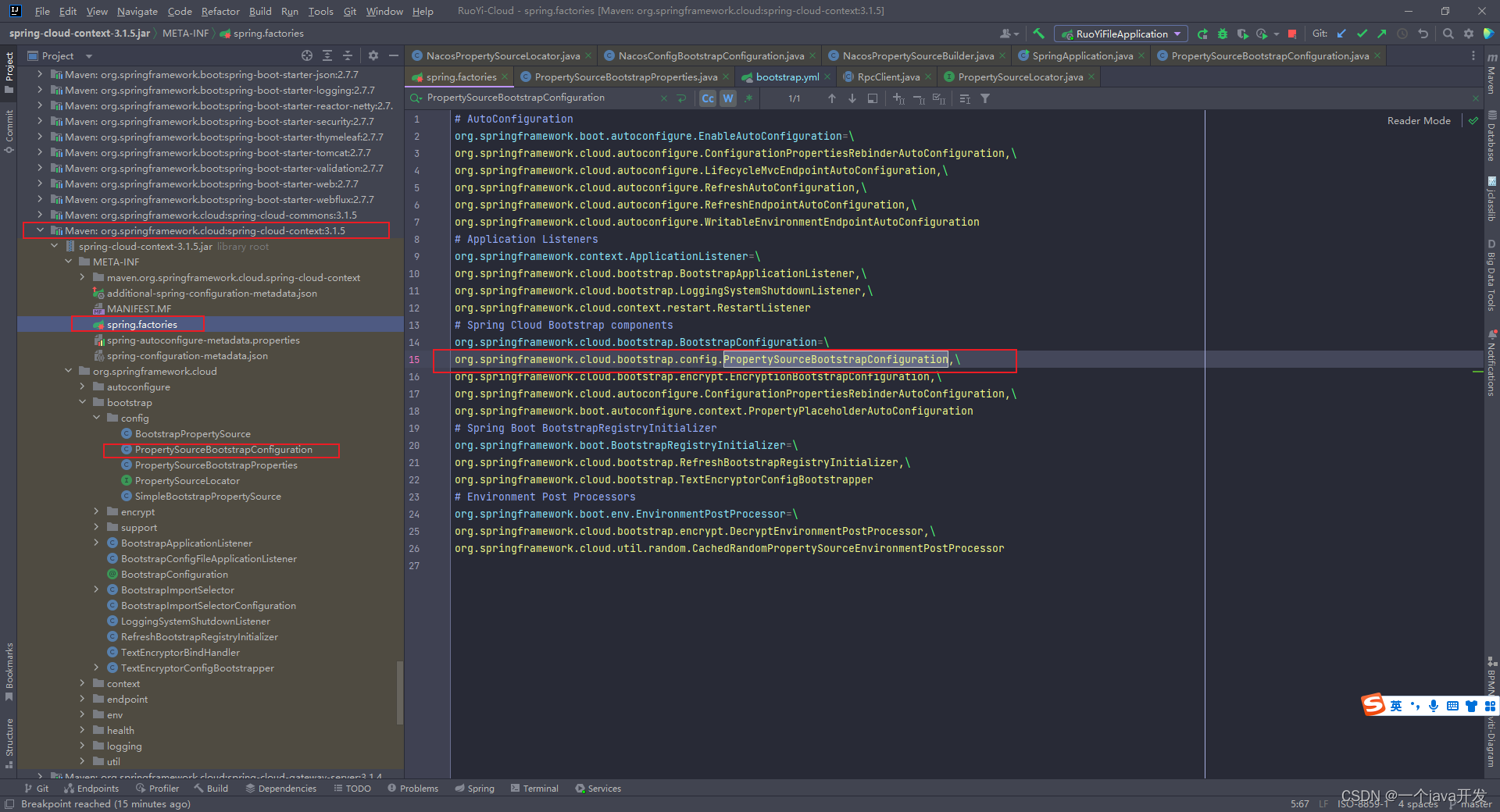
又因为PropertySourceBootstrapConfiguration实现了ApplicationContextInitializer接口,所以会在springboot启动过程(refresh方法前)被调用到(prepareContext-applyInitializers)它的initialize方法,会根据bootstarp.yml中指定的dev去加载对应的配置文件。initialize方法会调用之前已经注入的NacosPropertySourceLocator,
com.alibaba.cloud.nacos.client.NacosPropertySourceLocator#locate
该方法会一次加载三个配置文件
loadSharedConfiguration(composite);第一配置文件application-dev.yml loadExtConfiguration(composite);这里没配置就没有 loadApplicationConfiguration(composite, dataIdPrefix, nacosConfigProperties, env);第三配置文件ruoyi-system-dev.yml
加载的方法都差不多,发起请求去server端获取
com.alibaba.cloud.nacos.client.NacosPropertySourceBuilder#loadNacosData
com.alibaba.nacos.client.config.NacosConfigService#getConfigInner
com.alibaba.nacos.client.config.impl.ClientWorker#getServerConfig
com.alibaba.nacos.client.config.impl.ClientWorker.ConfigRpcTransportClient#queryConfig
queryConfig方法中会创建RpcClient并调用start方法创建与服务端的连接,已有就拿来用。
com.alibaba.nacos.client.config.impl.ClientWorker.ConfigRpcTransportClient#ensureRpcClient
RpcClient rpcClient = RpcClientFactory
.createClient(uuid + "_config-" + taskId, getConnectionType(), newLabels);
if (rpcClient.isWaitInitiated()) {
initRpcClientHandler(rpcClient);
rpcClient.setTenant(getTenant());
rpcClient.clientAbilities(initAbilities());
rpcClient.start();
}com.alibaba.nacos.common.remote.client.RpcClient#start
在start方法中,创建了一个线程池,提交了两个死循环的任务。
queryConfig方法中去请求服务端拿取配置文件:
ConfigQueryResponse response = (ConfigQueryResponse) requestProxy(rpcClient, request, readTimeouts);
com.alibaba.nacos.common.remote.client.grpc.GrpcConnection#request该方法会在请求body中加入一个type字段,实际就是request的类名,获取配置文件的话就是ConfigQueryRequest。
读取到配置文件之后将配置项设置到环境变量中,其他组件就能读取到了
com.alibaba.cloud.nacos.client.NacosPropertySourceLocator#addFirstPropertySource
org.springframework.core.env.CompositePropertySource#addFirstPropertySource
来自客户端的请求,访问到服务端的handler为
com.alibaba.nacos.config.server.remote.ConfigQueryRequestHandler#handle
这个方法的由来为nacos服务端启动时,注入了GrpcSdkServer,它实现了BaseRpcServer,BaseRpcServer中有个@PostConstruct标注的start方法
com.alibaba.nacos.core.remote.BaseRpcServer#start
com.alibaba.nacos.core.remote.grpc.BaseGrpcServer#startServer
@Override
public void startServer() throws Exception {
final MutableHandlerRegistry handlerRegistry = new MutableHandlerRegistry();
//指定处理请求的handler
addServices(handlerRegistry, new GrpcConnectionInterceptor());
server = ServerBuilder.forPort(getServicePort()).executor(getRpcExecutor())
.maxInboundMessageSize(getMaxInboundMessageSize()).fallbackHandlerRegistry(handlerRegistry)
.compressorRegistry(CompressorRegistry.getDefaultInstance())
.decompressorRegistry(DecompressorRegistry.getDefaultInstance())
.addTransportFilter(new AddressTransportFilter(connectionManager))
.keepAliveTime(getKeepAliveTime(), TimeUnit.MILLISECONDS)
.keepAliveTimeout(getKeepAliveTimeout(), TimeUnit.MILLISECONDS)
.permitKeepAliveTime(getPermitKeepAliveTime(), TimeUnit.MILLISECONDS)
.build();
server.start();
}会创建一个io.grpc的Server,这个是个抽象接口,实现类为ServerImpl,ServerImpl中有个InternalServer,InternalServer因为引入了netty,所以实现类为NettyServer 。并且调用addServices方法指定处理请求的acceptor为GrpcRequestAcceptor
com.alibaba.nacos.core.remote.grpc.BaseGrpcServer#addServices

com.alibaba.nacos.core.remote.grpc.GrpcRequestAcceptor#request
然后根据请求参数中带的type=ConfigQueryRequest,从服务端的持有的registryHandlers
Map<String, RequestHandler> registryHandlers = new HashMap<>();
中选出本次要用的ConfigQueryRequestHandler。
com.alibaba.nacos.core.remote.RequestHandler#handleRequest
com.alibaba.nacos.config.server.remote.ConfigQueryRequestHandler#handle
com.alibaba.nacos.config.server.remote.ConfigQueryRequestHandler#getContext
看来是提前将配置文件缓存到了服务端本地而没有放在数据库里。
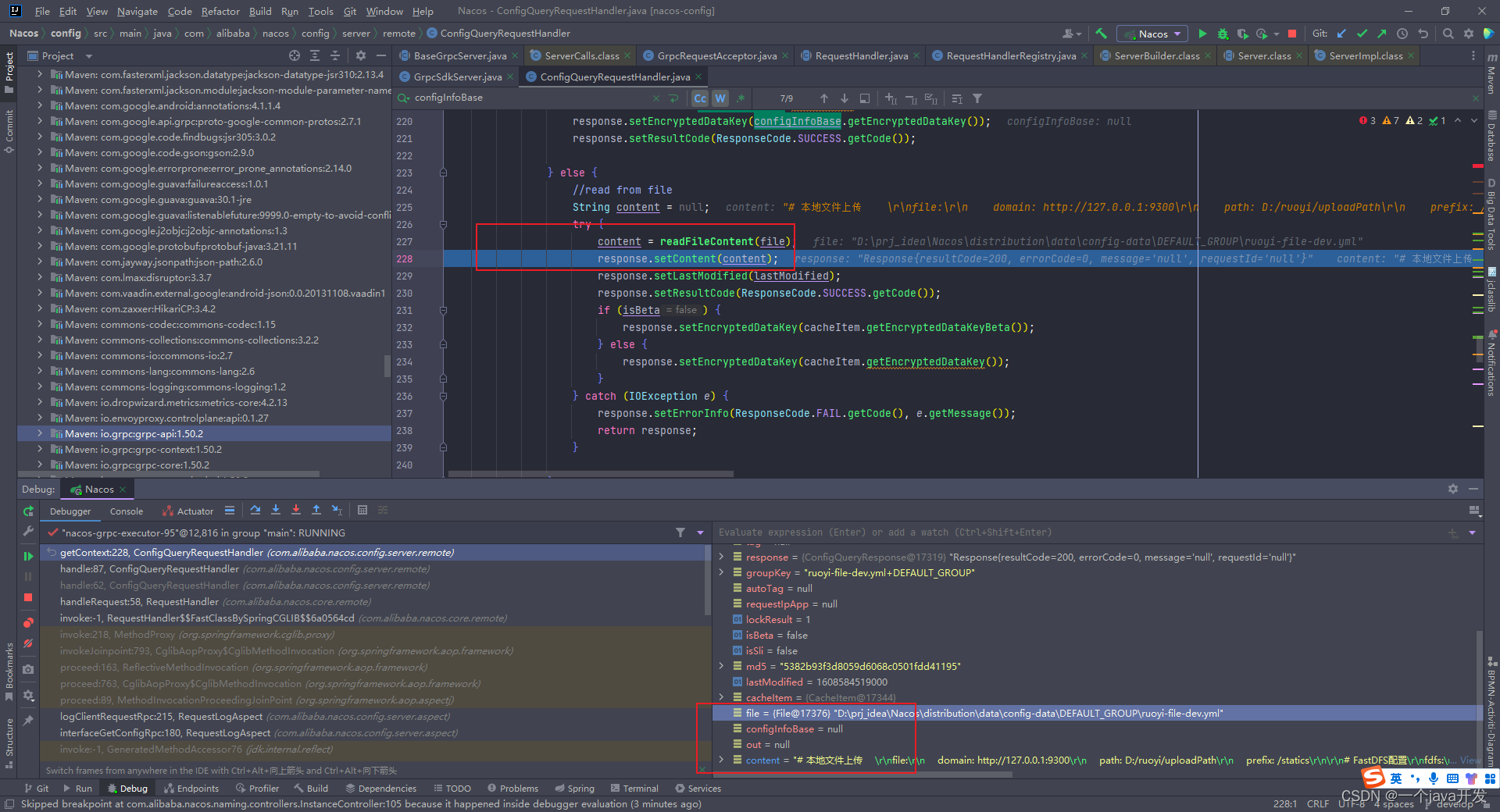
=======================================================
断点设置
从上可以看到,从客户端发到服务端的消息,肯定要经过客户端的com.alibaba.nacos.common.remote.client.grpc.GrpcUtils#convert(com.alibaba.nacos.api.remote.request.Request)
所以只要在这打个断点,就知道发往服务端的是什么,根据type参数也知道同时服务端应该用哪个handler来处理。 后面发现服务注册竟然没走这个接口,她在自己的方法里new了个请求对象,估计不是同一个人写的,该统一转换吧。。。
到达服务端的请求肯定要经过服务端的com/alibaba/nacos/core/remote/grpc/GrpcRequestAcceptor.java:96
服务注册走了这
从这能看到服务端谁来处理。大概都是type+Handler。
=================
服务端服务注册
客户端发送注册请求
com.alibaba.nacos.client.naming.remote.gprc.NamingGrpcClientProxy#requestToServer
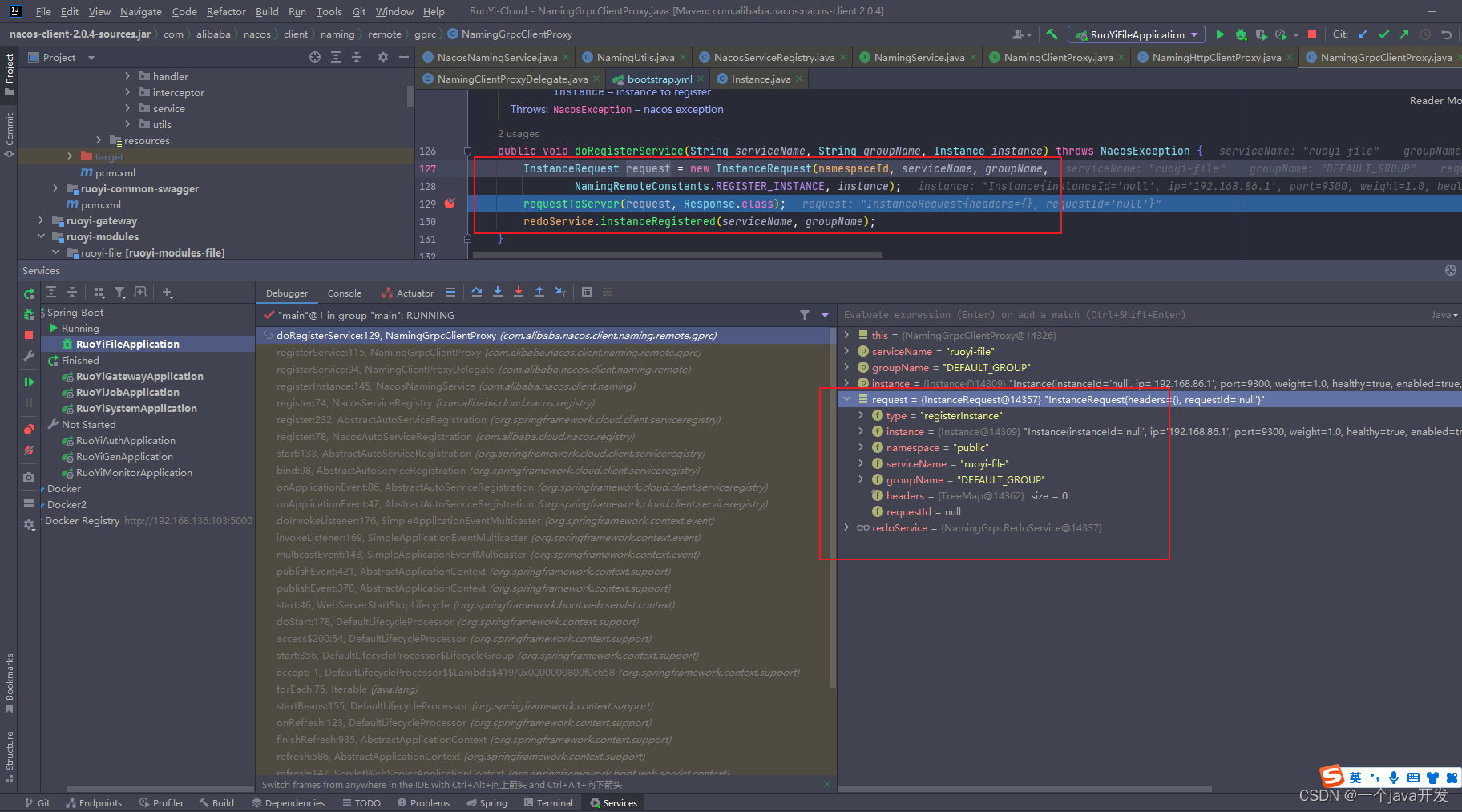
服务端收到注册请求
com.alibaba.nacos.naming.remote.rpc.handler.InstanceRequestHandler#handle

发现报错了
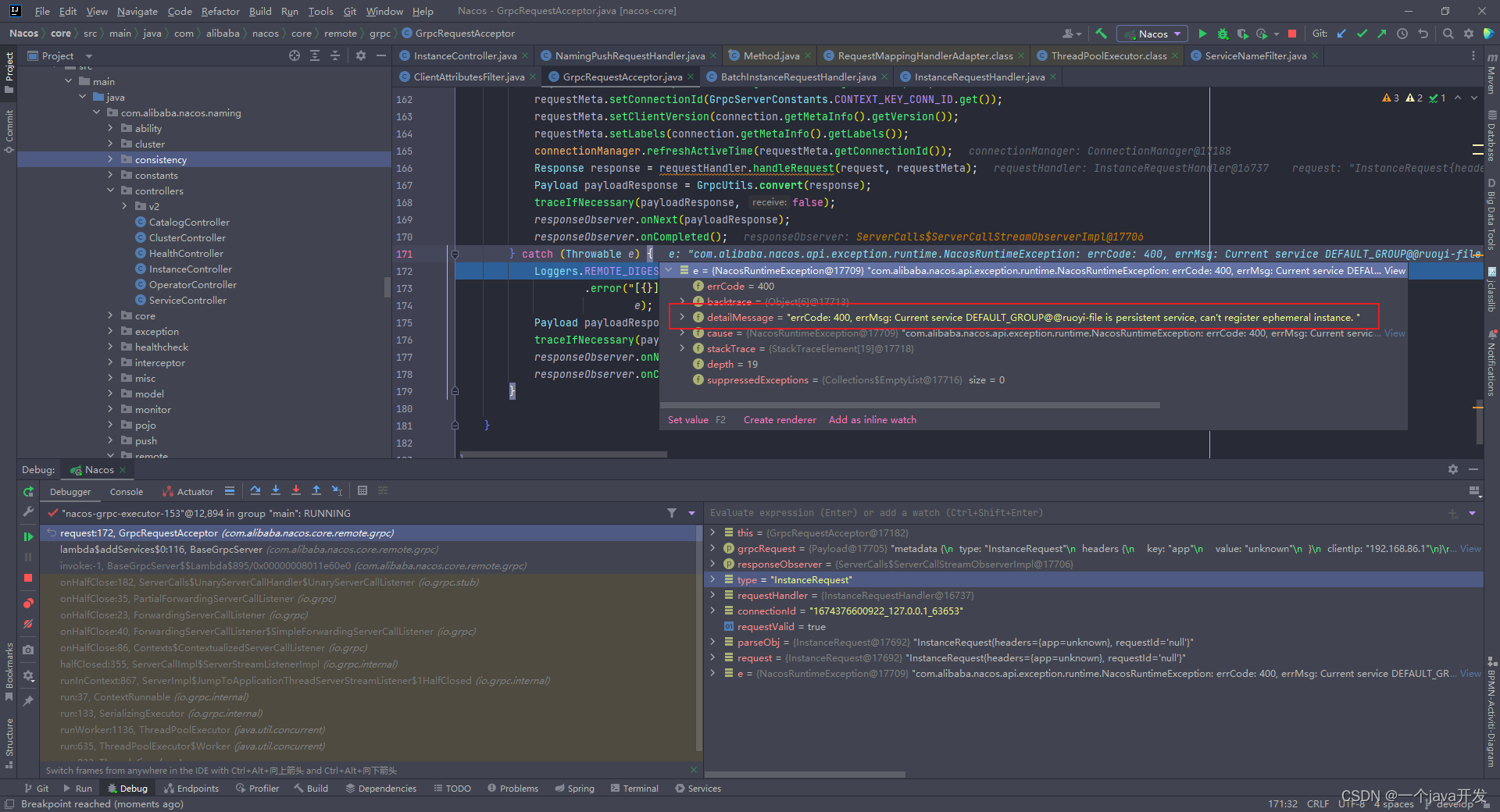
原因是我之前将这个微服务设置成了非临时实例,而现在我将它设置成了临时实例,因为临时实例才是走GRPC注册,否者是走InstancController去了,而我想看下GRPC。解决方法是停掉NACOS,将存在本地的METAdata删掉,我这是
"D:\prj_idea\Nacos\distribution\data\protocol\raft\
重启后解决。
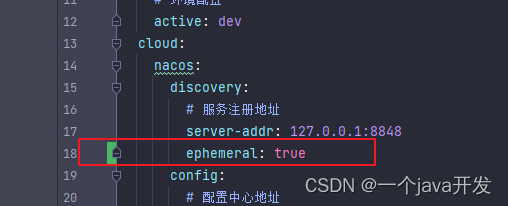
IP和端口都被服务端拿到了,然后发布两个事件ClientRegisterServiceEvent 和InstanceMetadataEvent。事件发布后告知客户端注册成功,剩下的事件在服务端异步处理。
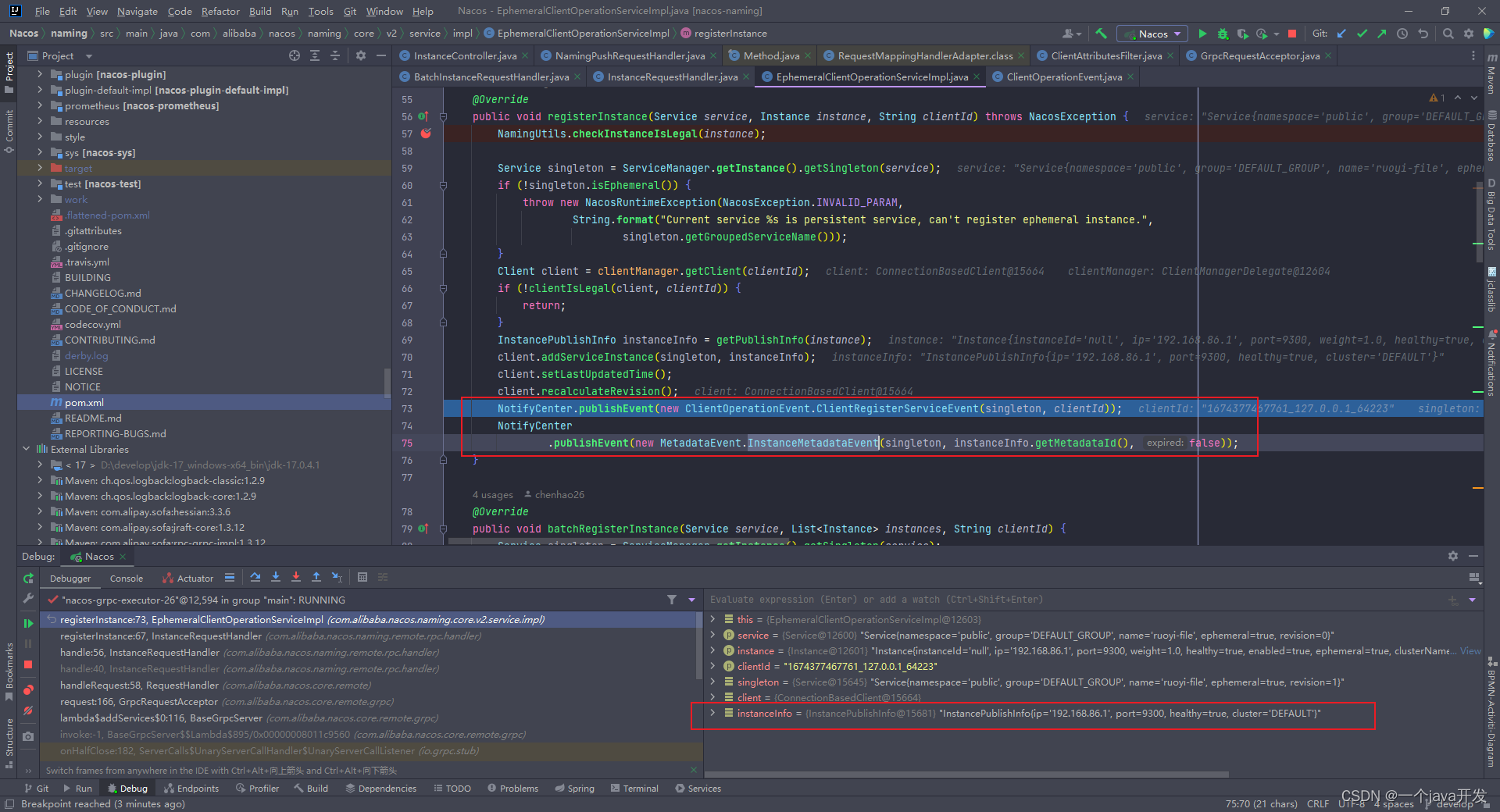
@Override
public void registerInstance(Service service, Instance instance, String clientId) throws NacosException {
//检查合法性,之前报错就从这出的
NamingUtils.checkInstanceIsLegal(instance);
Service singleton = ServiceManager.getInstance().getSingleton(service);
if (!singleton.isEphemeral()) {
throw new NacosRuntimeException(NacosException.INVALID_PARAM,
String.format("Current service %s is persistent service, can't register ephemeral instance.",
singleton.getGroupedServiceName()));
}
//更改该客户端对应的client对象
Client client = clientManager.getClient(clientId);
if (!clientIsLegal(client, clientId)) {
return;
}
InstancePublishInfo instanceInfo = getPublishInfo(instance);
client.addServiceInstance(singleton, instanceInfo);
client.setLastUpdatedTime();
client.recalculateRevision();
//通知我注册完成了
NotifyCenter.publishEvent(new ClientOperationEvent.ClientRegisterServiceEvent(singleton, clientId));
//通知我的元信息可能变了
NotifyCenter
.publishEvent(new MetadataEvent.InstanceMetadataEvent(singleton, instanceInfo.getMetadataId(), false));
}上面那两个事件在哪被处理?
第一个ClientRegisterServiceEvent
com.alibaba.nacos.naming.core.v2.index.ClientServiceIndexesManager#onEvent
ClientServiceIndexesManager这个类,里面两个map,估计是把注册上来的客户端的某些信息存在这,并且维护起来

存到map中后,又发了个事件ServiceChangedEvent,这个时间被NamingSubscriberServiceV2Impl监听。可以发现SmartSubscriber 、Subscriber
的实现类都是监听类
com.alibaba.nacos.naming.push.v2.NamingSubscriberServiceV2Impl#onEvent
将发生变化的客户端的最新信息推送给 订阅该客户端的其他客户端
@Override
public void onEvent(Event event) {
if (event instanceof ServiceEvent.ServiceChangedEvent) {
// If service changed, push to all subscribers.
ServiceEvent.ServiceChangedEvent serviceChangedEvent = (ServiceEvent.ServiceChangedEvent) event;
Service service = serviceChangedEvent.getService();
delayTaskEngine.addTask(service, new PushDelayTask(service, PushConfig.getInstance().getPushTaskDelay()));
MetricsMonitor.incrementServiceChangeCount(service.getNamespace(), service.getGroup(), service.getName());
} else if (event instanceof ServiceEvent.ServiceSubscribedEvent) {
// If service is subscribed by one client, only push this client.
ServiceEvent.ServiceSubscribedEvent subscribedEvent = (ServiceEvent.ServiceSubscribedEvent) event;
Service service = subscribedEvent.getService();
//将发生变化的客户端的信息推送给订阅该客户端的其他客户端
delayTaskEngine.addTask(service, new PushDelayTask(service, PushConfig.getInstance().getPushTaskDelay(),
subscribedEvent.getClientId()));
}
}


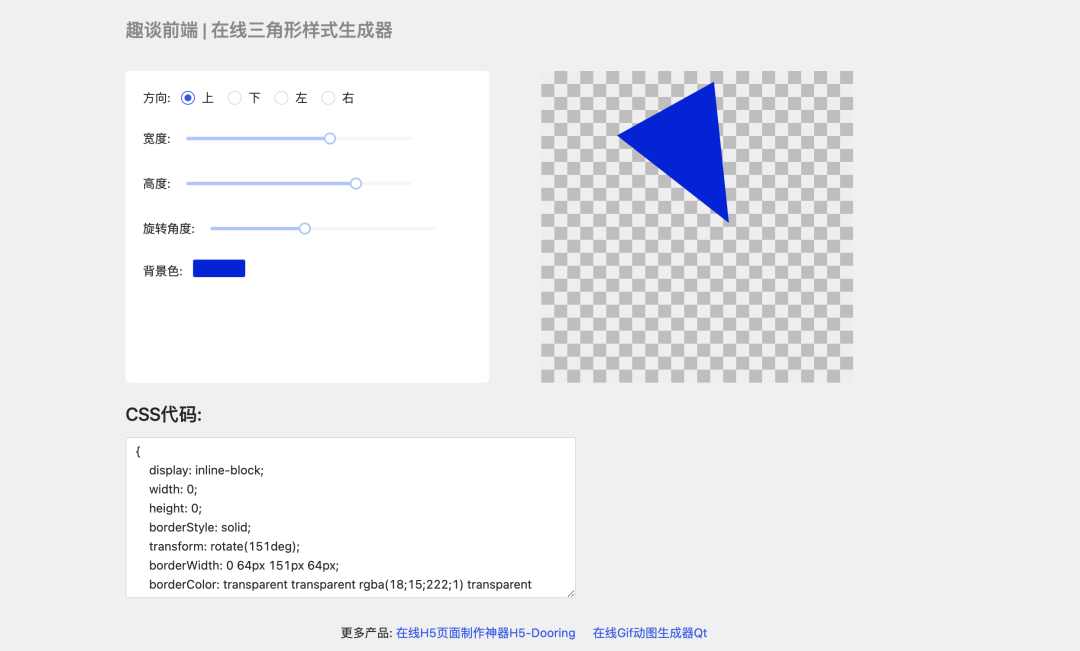
![[LeetCode周赛复盘] 第 96 场双周赛20230121](https://img-blog.csdnimg.cn/d972e2545ba9422182701f0a68f6a01c.png)
